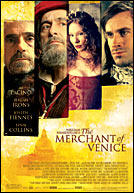William Shakespeare's The Merchant of Venice- ***

There are several problems with adapting Shakespeare to the screen. The big one is the language, and the fact that many actors just simply cannot say it without slipping into a strange melodramatic chanting. Second is the fact that everyone wants to put their personal stamp on it; changing the time, changing the setting, changing the focus. Sometimes this works, such as in Ian McKellen's Richard III. But The Merchant of Venice misses the mark.
The Merchant of Venice is a very problematic play, written as a comedy from the very anti-Semitic viewpoint of the 1590s. It definitely makes Shylock the bad guy, and revels in his defeat at the end. Rather than hide from it, this movie takes a more serious viewpoint, trying to make Shylock a sympathetic character, a man driven to his barbaric demands by the ill treatment of those around him. This does work, but only to a point. And when it cross cuts to the romantic subplot, it doesn't work at all.
The movie begins by showing Antonio (Jeremy Irons) spitting on a local Jew, Shylock (Al Pacino), who makes a living giving out of loans for interest. Antonio is a wealthy merchant, but all of his funds are tied up in shipping efforts. Bassanio is a young playboy who wants to set himself up as wealthy and travel to win the hand of Portia (Lynn Collins), and he asks Antonio to lend him some cash. Antonio agrees, and has to reluctantly go to Shylock for a loan of his own. Shylock agrees, but demands a grisly bond if the loan is not paid back by a certain date- a pound of Antonio's flesh. The romantic/comedic subplot involves Portia, who wants to marry, but is held by her father's wish that she must put each suitor in front of three boxes of gold, silver and lead. Whoever picks the correct box will be her husband, and Bassanio is determined to win.
The Merchant of Venice cuts back and forth between the comedic plot and the serious plot, and attempts to solve the problem by making everything serious. This does work for the Shylock, especially during the "If you prick us, do we not bleed?" speech. This is a movie that reminds you just how good Al Pacino really can be. While you don't agree with Shylock's revenge, you find yourself understanding where it comes from. The problem comes with lines like "Oh my daughter! Oh my ducats!" He was written to be a greedy, contemptuous man, placing his daughter on the same level as his money, and lines like this undercut the sympathy the film is trying to build.
The other problem is slowing down the Portia subplot. Particularly the coda of the movie, which is supposed to be played for laughs. I personally dislike the last act of the play, and I like it even less in this movie, which tries to give weight to a stupid practical joke, and winds up just making the last 15-20 minutes of the movie laborous.
While these changes do affect the movie, there are still some wonderful things about it. The cinematography is excellent, painting a dark, craggy view of Venice and contrasting it with the opulent beauty of Portia's island mansion. The performances are almost all excellent as well. Pacino, Irons and Fiennes all have a good sense of the dialogue, and manage to speak it as if they were conversing in everyday language. Collins, as Portia, is the only weak link, and I can't decide if this is because of his performance or because of the way the movie was done. I never thought she was bad, but I never found myself as interested when she appeared on screen.
This movie has been praised for its revisionist take on a difficult play, and I can see and appreciate what they were trying to do. It is the kind of thing where you want to applaud the effort, even though the finished product only works half the time. Shakespeare fans will appreciate this, but all others might want to be wary.








0 Comments:
Post a Comment
<< Home